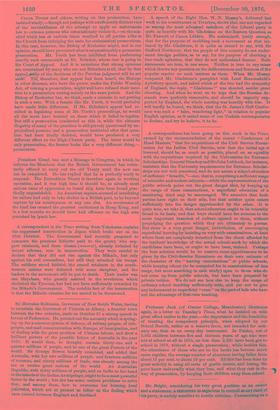A correspondence has been going on this week in the
Times, caused by the recommendation of the recent "Conference of Head Masters," that the xequisitions of the Civil Service Exami- nation for the Indian Civil Service, now that the initial age is lowered, should be, as much as possible, placed on an equality with the requisitions required by the Universities for Entrance Scholarships. General Strachey and SirJohn Lubbock, for instance, maintain that the University requirements for Entrance Scholar- ships are not well conceived, and do not assure a school education of sufficient "breadth,"—one, that is, comprising a sufficient range of scientific andmodern subjects,—while the representatives of the public schools point out the great danger that, by keeping up the range of these examinations, a superficial education of a smattering kind may be encouraged. We conceive that both parties have right on their side, but that neither quite enters sufficiently into the danger apprehended by the other. It is quite true, we take it, that school education ought to be tolerably broad in its basis, and that boys should have the avenues to the more important branches of culture opened to them, without prejudging the question which they are ultimately to pursue. But there is a very great danger, neWrtheless, of encouraging superficial learning by insisting on very wide examinations, at least where these are completely detached from the check afforded by the teachers' knowledge of the actual school-work by which the candidates have been, or ought to have been, trained. Perhaps the best solution would be to reserve some appointments to be given by the Civil-Service Examiners on their own estimate of the character of the "leaving examinations" at public schools, while keeping others (to be competed for in examinations of less range, but more searching in each study) open to those who do not come up from public schools, but have been prepared by private tuition. We do not see how else to keep the range of ordinary school teaching sufficiently wide, and yet not to give any inducement to superficial " cram " on the part of lads who have not the advantage of first-rate teaching.


































 Previous page
Previous page